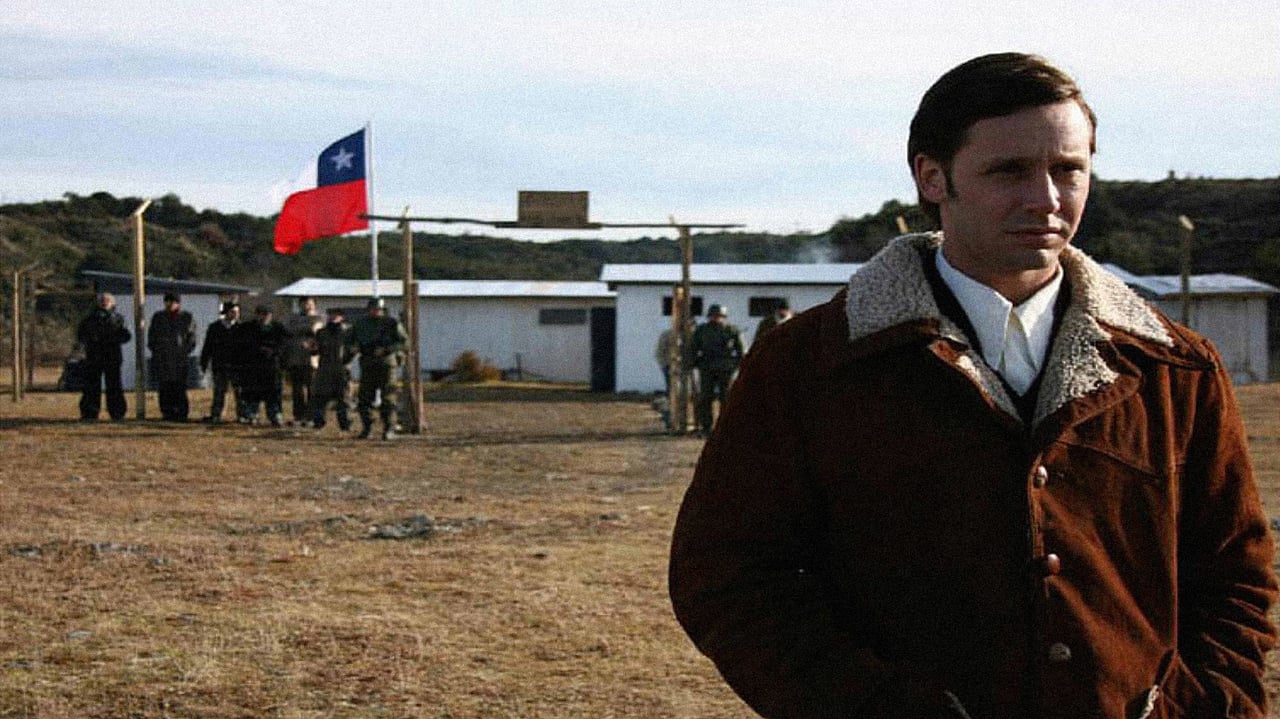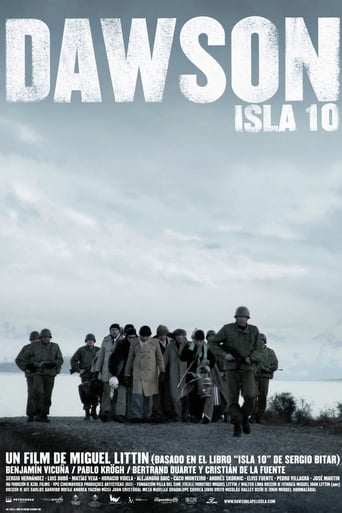

SERIOUSLY. This is what the crap Hollywood still puts out?
... View MoreExpected more
... View MoreCrappy film
... View MoreUnshakable, witty and deeply felt, the film will be paying emotional dividends for a long, long time.
... View MoreThis 2009 Chilean film, based on the diary of one of the inmates, depicts a group of prominent Chilean political prisoners in the 1970s. After the government of elected "Socialist" President Salvador Allende was ousted in 1973, in a CIA-engineered coup d'état led by army general-turned-dictator, Augusto Pinochet, ten surviving members of Allende's cabinet were consigned to a navy-run prison camp on the cold and forbidding Dawson Island, in the Strait of Magellan, a region infamous for some of the world's worst weather.On the surface, as a prisoner-of-war film, "Dawson Island 10" has the expected dramatic tension. Despised as "Communists" and "traitors" by most of their captors, the inmates are forced to perform hard labor under punishing conditions and are routinely insulted and degraded. The living conditions portrayed in the film, however, including comfortable-looking beds and bedding, are at odds with the descriptions of squalor that appeared in later authoritative government and international reports. The prison commandant, an old-school naval officer, is shown giving lip service to honoring the Geneva Conventions on the treatment of prisoners of war and believing that he is "rehabilitating" his captives, turning them into "better people" through hard labor. The film indicates that, with time, he develops a degree of respect for their intelligence and abilities. (They repair his malfunctioning radio.) It also shows him resisting subordinate army officers who agitate repeatedly for solving the growing problem of prison overcrowding by executing some or all of the prisoners. Instead, he orders the building of more barracks. The film depicts the transfer back to the mainland (amidst dire forebodings) of ailing former Defense Minister Jose Toha. It does not, however, show his actual fate at his destination, the Air Force War Academy in Santiago: endless tortures followed by hanging. Even if the film's portrayal of the Dawson Island prison commandant's humanity was accurate, it would be a great mistake to conclude that this behavior was typical of the Chilean Navy. In fact, its Admiral Merino was one of the principal coup leaders and the Naval War Academy in Valparaiso was one of the regime's most notorious torture/murder centers.As a historical political document, however, "Dawson Island 10" fails utterly. Instead of analyzing the suicidal policies of Allende & Co. in their "peaceful, parliamentary road to socialism," it surrounds the fallen "Comrade President" with a halo of near-religious awe and perpetuates those fatal myths. One of the former cabinet members speaks glowingly about their desire to "take power without firing a shot." No one speaks out against this idiocy. Several of them, bemoaning their fate, cry out: "how did this happen?", "what did we do wrong"? It was all I could do to restrain myself from yelling at the top of my voice "you let the fascist bastards take power, that's what you did wrong!" It was not only these prisoners who appear to have learned NOTHING from the overthrow of the Allende regime. The filmmakers seem to have learned nothing as well. They raised not the slightest challenge to the deeply Stalinist and reformist notion that capitalism can be overthrown from WITHIN the system — one of the deadliest political illusions in today's world. As Karl Marx wrote after the French capitalists crushed the glorious Paris Commune of 1871: "the working class cannot simply lay hold of the ready-made state machinery and wield it for its own purposes." On the contrary, it is necessary for the workers to DESTROY the capitalists' state machinery and replace it with a state that advances the interests of THEIR class. If only that lesson would be learned, the Chilean martyrs will not have suffered and died in vain.Barry Freed
... View MoreI have to admit, I didn't read the book, and have not watched "la Nana" the other acclaimed Chilean film; so when I began to see this movie I wait to find something unique, the taste of the Chilean talent but after five minutes I found a few things used by others directors: camera on the hand technique and of course the good looking hero (vicuña, his acting it's very good but they could use some new face) like "Saving private Ryan" , basically in the first minutes of the movie to impact the audience with this world. Chile it's a beautiful place, and any good director (I mean like Terrence Malick)can do good scenes, but after a few minutes there is nothing more than the basic story, the good acting, and the sense they could do so much more.------ warning possibly spoiler------- About politics, I was hoping a human side in every aspect, and for most part of the movie I found it, but there are some scenes terrible, I don't care who was the bad guy in the past, I care for the heart of the people who live it, but here Littin took his side in way almost ridiculous and in that moment I confirm I was watching the same old story about the traumas of the Pinochet time.Frankly, I' m not a fan of the Chilean cinema, I loved "Tierra del fuego" of Littin, but watch this movie reminds me the very painful experience of "Transformers 2", counting every second to the end, feeling the bad taste of what could be. There are many kinds of bad movie, for me this is some kind of art trash (or art of trash), I mean a film made to be a piece of art, but in the end the ambition of the director kill the poetry when he do things who seems to be different of the commercial movies, but are the same thing you can find in other better works.After watch a movie like this cannot stop to praise "la Nana" at least to make something different.
... View MoreAfter the Army took over Allende's government -Chile, Sept. 1973- a group of people, including Allende's ministers and closer friends, were sent to Dawson Island, a place located almost at the end of the continent. The movie pictures how they managed to survived and also the way they were treated by soldiers and how in several opportunities they escaped from death. The movie is based on a book by Sergio Bitar, one the prisoners there, and the movie showed us a piece of history that shouldn't be forgotten by any Chilean. I went to watch this film with my dad, who was in Dawson island as well, I saw him crying and he told me "That was what happened there" A great film, a great story.However, a plot that must never be repeated in history again.
... View More